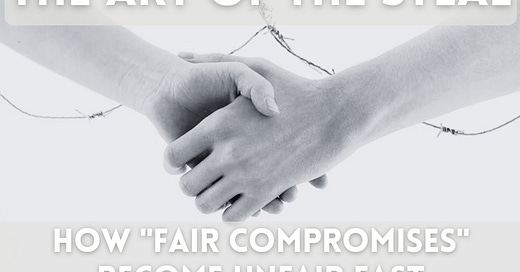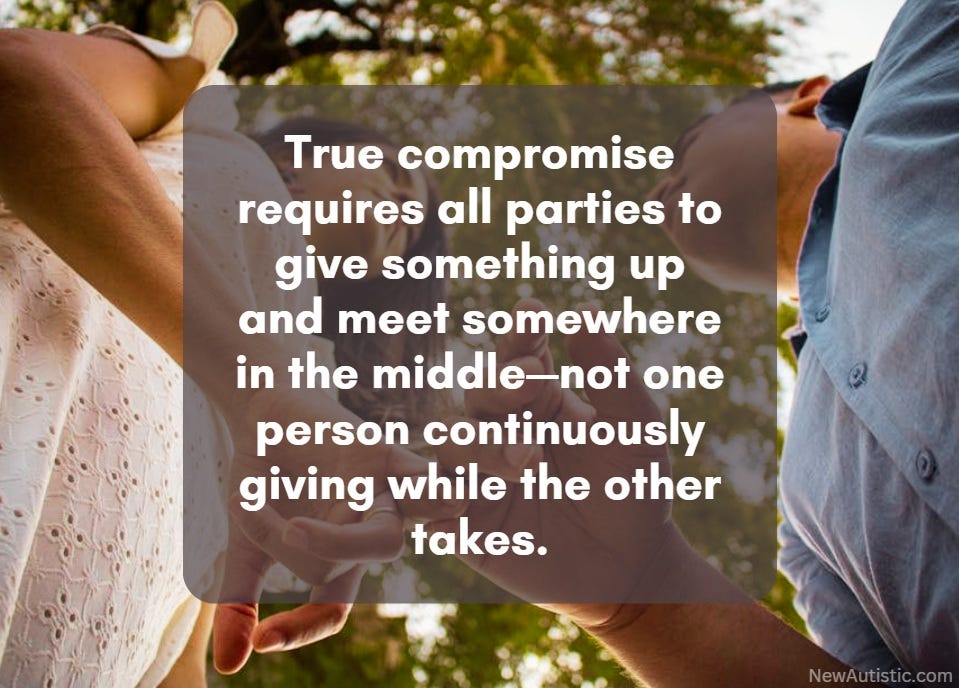The Art of the Steal: How "Fair Compromises" Become Unfair Fast
A Survivor's Guide to One-Sided Compromise
In the fields of mental health and self-help, there is always so much talk about compromise, how everyone has to compromise, and how important it is to compromise in order to make relationships work. At face value, I agree with these sentiments—that is, compromise is often necessary in order to make things work. No one person can always get their way all the time, or else that would be unfair.
What I’d like to address in this article, however, is how often compromises are turned into weapons to be used against us, especially by those who never had any intention of meeting you in the middle in the first place. Through education and knowledge, we can start to set our own healthy boundaries, especially when it comes to unhealthy dynamics.
“Meet me in the middle, says the unjust man. You take a step towards him, he takes a step back. Meet me in the middle, says the unjust man.” ―A.R. Moxon
A Middle School “Meeting in the Middle”
When I was in middle school, I had a friend I’ll refer to as Anthony. He and I had been friends for many years, were in the chess club together (and two of the best players), and had been in most of the same classes since we were much younger. By the time we were in 8th grade and getting ready to graduate to move onto high school, I considered him one of my better friends.
In our history class, we had a final project to do before we graduated—but it was a group project, which made me cringe. I always disliked group projects because I was typically the one who ended up doing the majority of the work for any group I was assigned to. However, to my surprise and delight, I was paired with Anthony for this project. He was smart and hard working, and I figured that, for once, I wouldn’t have to do the vast majority of the work alone.
Planning the Project
Anthony and I sat down and laid out the parts of the project: the introduction, parts 1-3, a conclusion, and then a presentation—y’know, basic middle school projects. I offered to take on part 3, the conclusion, and the presentation if Anthony would take on the introduction along with parts 1 and 2. He suggested that since putting together the presentation was the “easiest part,” I should do parts 2-3, the conclusion, and the presentation. I hesitated as that didn’t exactly seem fair to me, but I ultimately agreed in order to keep the peace and the friendship. It looked like I’d have to do a bit more work than half, but that was still better than doing all of it alone.
I worked diligently on my parts, but in order to put together the conclusion and presentation, I would need Anthony’s contributions as well. As the days and weeks ticked by and the due date approached, I asked him if he’d finished his parts yet. “No,” he told me, “And I don’t intend to. I know that even if I don’t do them, you’re going to do them anyway because you want a good grade.”
I stared at him, mouth agape, unsure what to say. “Y-You’re not going to do anything?” I stuttered, confused. “No,” he confirmed, and before we could talk more about it, he turned on his heel and walked away. I had already compromised in agreeing to do the majority of the project, and yet he still couldn’t up his end of the bargain. I was so upset!
But, to Anthony’s credit, he was right. I did end up doing the entire project by myself, and we both ended up getting an A on it. (This was before teachers began asking for group feedback about who had done what, and since I wasn’t a snitch, I kept my mouth shut.) After that day, however, I didn’t consider Anthony a friend anymore, and I never spoke to him again.
What’s the Lesson?
You might now be thinking that this is a vent post about some long-held grudge against an 8th grader. Let me first assure you that I am no longer upset with Anthony; in fact, with the benefit of hindsight, I’m guessing that he had a lot of issues going on at home that led him to burn a close friendship he’d had for years. Secondly, in the huge scope of things, me having to do a whole group project alone wasn’t the end of the world.
Where this lesson on compromises (or perhaps lack thereof) comes into play though is through our own adult relationships with friends, family, coworkers, and romantic partners. I’m sure you can think of at least a few times in your life where you’ve gone out of your way to make compromises with people, only to have them renege on them, or alter the terms of the agreement after the agreed-upon work has already been done.
The Chore Wars
We see this play out when it comes to domestic chores and the mental load all the time. One partner is the one keeping the trains running on time (the manager) and doesn’t want to have to constantly beg the other partner (the passenger) to contribute. When it’s brought up, the passenger shoots back, “I’d do the chores if you’d just tell me what to do!”
However, having to tell someone what basic household tasks to do constitutes work in and of itself. (There’s a reason managers earn a salary in businesses: it takes work to manage things.) Reluctantly, the manager agrees to start telling the passenger what chores need to be done, but soon enough, the passenger starts slacking again even with the verbal reminders.
Frustrated, the manager asks the passenger why the chores still aren’t getting done. “I’d do the chores if you’d just make me a list!” the passenger quips back. Reluctantly, the manager again agrees to do more work, creating and handing over a written list of chores for the passenger to do—which either get done poorly or don’t get done at all.
Frustrated and angry, the manager demands to know why the passenger still isn’t holding up their end of the bargain. “I didn’t know how to do half the chores on this list, so you need to teach me how to do them!” the passenger cries.
Do you see where I’m going with this? The manager has already compromised multiple times, agreeing to take on more and more of the mental load, and yet still the passenger refuses to contribute in any meaningful way. This situation can be and often is replicated in any number of relationships: romantic, platonic, or professional. Regardless of the relationship, it’s not a compromise if only one person is doing the compromising.
Finding Balance in True Compromises
As we've seen through both the middle school project scenario and the chore wars example, what masquerades as “compromise” can often be manipulation. True compromise requires all parties to give something up and meet somewhere in the middle—not one person continuously giving while the other takes and takes and takes.
Healthy relationships (romantic, familial, professional, or friendly) thrive on mutual respect and balanced give-and-take. When you notice yourself consistently being the one to bend, it may be time to have an honest conversation about expectations or, in some cases, to reevaluate the relationship entirely.
10 Reflection Questions: Is this a True Compromise?
Learning to recognize when you’re the only one making concessions is the first step toward establishing healthier boundaries for yourself. Here are 10 questions you can ask yourself if you’re unsure:
Is this truly a compromise, or am I the only one adjusting my expectations and behavior?
Am I being asked to compromise on the compromise itself (ie. is there always “just this one more thing” being added on)?
Are my accommodations being met with reciprocal effort, or am I being pushed to give more and more?
When I express concerns about the arrangement, are they genuinely addressed or summarily dismissed?
Is the other person willing to acknowledge and appreciate the concessions I make?
If our roles were reversed, would the other person be willing to make the same concessions I'm making?
Am I agreeing to this compromise out of fear, guilt, or obligation rather than genuine willingness?
Do I feel comfortable expressing what I need in this situation, or am I afraid of the consequences?
Am I consistently the one who gives in first, or is there a balanced pattern of give-and-take?
Would I advise a friend to accept the same arrangement I'm considering?
The Uncompromising Truth About Compromise
Remember that setting boundaries isn't selfish; it’s necessary for your well-being. Sometimes the most powerful thing you can do is refuse to participate in a one-sided “compromise” that only serves to deplete your energy and goodwill. Real compromise should leave both parties feeling respected, heard, and valued rather than resentful or taken advantage of.
By understanding the difference between true compromise and manipulation, we can build stronger, more equitable relationships based on mutual respect rather than exploitation. After all, meeting in the middle only works when both people are genuinely walking toward each other.
Thanks for Reading!
Thanks for taking time out of your busy day to spend some time with me! I encourage all of my readers to RISE (Reflect, Improve, Strengthen, & Evolve) with me because healing is a lifelong journey — it’s not always easy, but it’s always worth it. You are loved, cherished, and valued. Don’t ever let anyone ever convince you otherwise.
My commitment to bringing you FREE, well-researched, and comprehensive content means I spend considerable time and effort writing each article or post without compensation.
Want to Support Me?
The simplest FREE way you can support me is by subscribing, sharing, or leaving a comment:
I believe in keeping my content accessible to everyone, without paywalls, because I know the work I do matters. For that reason, I’m beyond grateful for any financial support! If you'd like to support me and my work, check out my art website at AriesArtwork.com to bring home something unique or find a gift for that special someone in your life:
I’ll see you again when I’ve got a new info-dump for you, my Newtistics Crew!
—Skylar Aries








